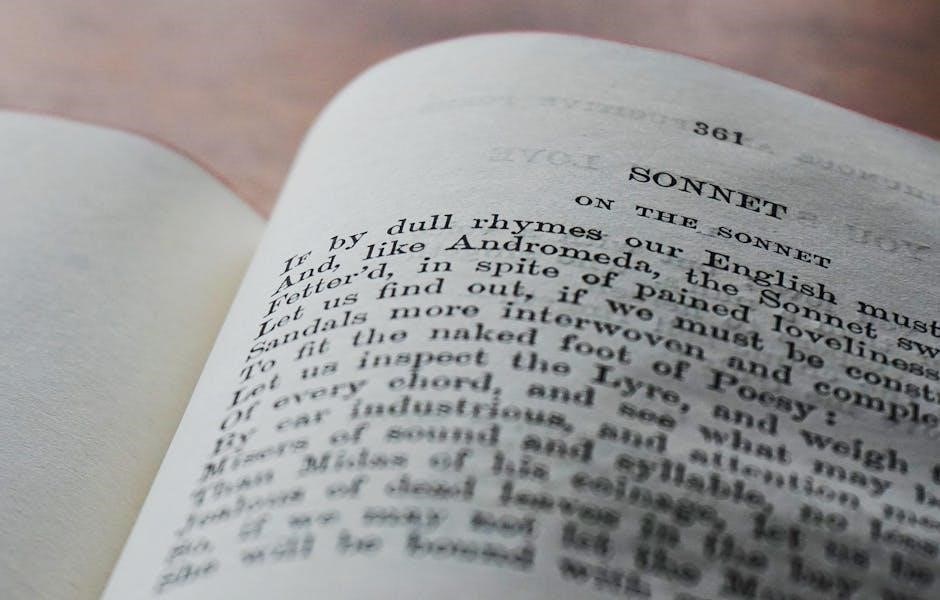the poems of nakahara chūya pdf
Nakahara Chūya’s poetry is a harmonious blend of traditional Japanese forms and modern sensibilities, capturing themes of love, nature, and existential reflections with musicality and depth.
1.1. Biography of Nakahara Chūya
Nakahara Chūya was born in 1907 in Yamaguchi Prefecture, Japan. From an early age, he was immersed in literature, developing a deep appreciation for poetry. He co-founded a literary magazine, Kazue, which showcased his early works. Chūya’s life was marked by both creative brilliance and personal turmoil. He traveled extensively, including a visit to Tokyo and later to France, where he further honed his poetic style. Despite struggling with poor health, he produced remarkable poetry that blended traditional Japanese forms with modern sensibilities. Tragically, he passed away in 1937 at the age of 30. His legacy endures, with his poems capturing themes of love, nature, and existential reflections. Today, his works are widely available in PDF formats, making his poetic genius accessible to readers worldwide.

1.2. Historical Context of His Work
Nakahara Chūya’s poetry emerged during a period of cultural and literary transformation in early 20th-century Japan. His work reflects the tension between traditional Japanese aesthetics and the influence of Western modernism. Born in 1907, Chūya witnessed the Meiji era’s decline and the rise of Taishō modernity, which shaped his poetic voice. He was part of the Japanese modernist poetry movement, which sought to break free from classical forms while embracing new expressions. His travels, including a brief sojourn in France, further enriched his perspective. Despite his short career, Chūya’s poetry captured the essence of a society in flux, blending nostalgia for tradition with an embrace of modernity. His work remains a testament to this pivotal era in Japanese literary history.
1.3. Importance in Modern Japanese Poetry
Nakahara Chūya is celebrated as one of the most innovative and influential poets of modern Japan. His work bridges traditional forms and modern sensibilities, making him a pivotal figure in Japanese literary history. Chūya’s poetry is admired for its lyrical beauty, emotional depth, and exploration of universal themes such as love, nature, and existential questioning. His unique style, blending classical Japanese aesthetics with Western influences, has inspired generations of poets and writers. Today, his poems are widely studied and admired, both in Japan and internationally, solidifying his legacy as a master of modern Japanese poetry. His influence continues to resonate, ensuring his work remains relevant and timeless.

Themes in Nakahara Chūya’s Poems
Nakahara Chūya’s poems explore love, longing, nature, and existential reflections, blending traditional Japanese aesthetics with modern sensibilities to create a unique and enduring literary legacy.
2.1. Love and Longing
Nakahara Chūya’s poetry is deeply infused with themes of love and longing, often expressed through delicate imagery and emotional vulnerability. His works, such as Sheep Song and The Moon, capture the intensity of romantic desire and the melancholy of unrequited love. Chūya’s portrayal of love transcends the personal, resonating with universal human experiences. His use of natural metaphors, like the moon and celestial imagery, elevates these emotions to a cosmic scale. The interplay between passion and sorrow in his poems reflects his own tumultuous life, making his exploration of love both deeply personal and universally relatable. This duality has made his poetry a timeless reflection of the human heart.
2.2. Nature and the Cosmos
Nakahara Chūya’s poetry often explores the profound connection between nature and the cosmos, using vivid imagery to evoke universal wonder. His poems, such as The Moon, depict celestial elements with human-like qualities, creating a sense of intimacy with the vastness of the universe. Chūya’s work frequently personifies natural phenomena, like stars and the moon, to convey emotional and philosophical depth. The interplay between the earthly and the cosmic in his poetry reflects his belief in the interconnectedness of all existence. This theme not only enriches his verses with beauty but also invites readers to contemplate their place within the larger cosmic narrative, making his poetry both deeply personal and universally resonant.
2.3. Existential Reflections
Nakahara Chūya’s poetry delves into profound existential reflections, exploring themes of human existence, impermanence, and the search for meaning. Poems like Exhaustion and Song of Days Past reveal a deep introspection into life’s struggles and the fleeting nature of time. Chūya’s work often expresses a sense of weariness and melancholy, yet it is balanced by a resilient spirit that seeks to find beauty in adversity. His verses invite readers to confront their own mortality and emotional depths, making his poetry both deeply personal and universally relatable. Through his unique voice, Chūya bridges the gap between individual experience and the broader human condition, offering a poignant commentary on existence that continues to resonate with readers today.

Poetic Style and Technique
Nakahara Chūya’s poetry is renowned for its musicality, employing traditional 7-5 meter and free-verse forms; His work masterfully blends sound devices, rhyme, and non-traditional structures, creating a unique lyrical resonance.
3.1. Use of 7-5 Syllabic Meter

Nakahara Chūya masterfully employed the traditional Japanese 7-5 syllabic meter, blending it with modern free-verse techniques. This structure, known as “shi,” allowed for a rhythmic flow that enhanced the musicality of his poems. His use of this meter created a sense of balance and harmony, often juxtaposed with unconventional imagery and emotional depth. Poems like The Moon and Sheep Song exemplify this technique, where the meter complements the lyrical quality of his language. Chūya’s ability to adapt the 7-5 meter to his unique style highlights his innovation while respecting traditional poetic forms; This blend of structure and creativity is a hallmark of his work, making his poetry both accessible and deeply resonant with readers.
3.2. Sound Devices and Musicality
Nakahara Chūya’s poetry is renowned for its rich musicality, achieved through meticulous use of sound devices. His work often features alliteration, assonance, and consonance, creating a melodic quality that enhances the emotional impact of his themes. For instance, in The Moon, the repetition of soft consonants and vowel sounds evokes a serene yet haunting atmosphere. Similarly, Sheep Song employs rhythmic patterns that mimic the natural world, adding depth to its pastoral imagery. Chūya’s ability to weave sound and sense together reflects his mastery of both traditional and modern poetic techniques, making his verses sing with a unique lyricism that captivates readers and underscores his innovative approach to language.
3.3. Free-Verse and Non-Traditional Forms
Nakahara Chūya’s poetry often diverges from traditional forms, embracing free-verse and non-traditional structures to convey complex emotions and ideas. His work, such as Exhaustion and Song of Days Past, frequently eschews rigid syllabic patterns, allowing for a more fluid and expressive style. This approach enables Chūya to explore themes like existential reflection and personal longing with a spontaneity that traditional forms might constrain. His use of fragmented imagery and stream-of-consciousness techniques creates a unique poetic identity, blending modern experimentation with elements of classical Japanese aesthetics. This blending of styles not only sets his work apart but also highlights his innovative contribution to modern Japanese poetry, making his verses both deeply personal and universally resonant.

Notable Poems by Nakahara Chūya
Nakahara Chūya’s notable poems include The Moon, Sheep Song, Exhaustion, and Song of Days Past, each capturing music through sound devices and alternating meters, showcasing his poetic mastery.
4.1. “The Moon” (, Tsuki)
Nakahara Chūya’s The Moon is a poignant exploration of existential themes, blending vivid imagery with a melancholic tone. The poem captures the moon’s ethereal presence, reflecting on life’s fleeting nature. Chūya’s use of traditional 7-5 syllabic meter creates a musical quality, while his imagery, such as the moon smoking a cigarette, adds a surreal touch. Translated by Christian Nagle, The Moon showcases Chūya’s ability to weave celestial beauty with human longing, making it a standout piece in his collection. Its themes of isolation and the cosmos resonate deeply, highlighting Chūya’s unique voice in modern Japanese poetry.
4.2. “Sheep Song” (, Hitsuji no Uta)
Nakahara Chūya’s Sheep Song is a masterful exploration of existential themes and human struggle. The poem, translated by Christian Nagle, captures the essence of Chūya’s unique voice, blending traditional forms with free-verse elements. Its musicality, achieved through sound devices and alternating meters, evokes a sense of longing and melancholy. The imagery of sheep and pastoral landscapes serves as a metaphor for the search for meaning in a chaotic world. Sheep Song reflects Chūya’s ability to balance the personal with the universal, making it a profound and enduring work in modern Japanese poetry. Its emotional depth and poetic craftsmanship continue to resonate with readers today.
4.3. “Exhaustion” (, Tsukare)
“Exhaustion” by Nakahara Chūya is a poignant exploration of physical and emotional weariness, rendered with his characteristic sensitivity and depth. The poem delves into themes of fatigue, both as a bodily state and a metaphor for existential despair. Chūya’s use of free-verse style allows for a fluid, introspective narrative, capturing the weight of daily struggles and the search for solace. Through vivid imagery and evocative language, he conveys the universal experience of being drained, yet persisting. “Exhaustion” exemplifies Chūya’s ability to transform personal experiences into profound reflections on the human condition, making it a compelling piece in his oeuvre. Its emotional resonance and lyrical quality continue to captivate readers, offering a glimpse into the complexities of life and resilience.
4.4. “Song of Days Past” (, Arishi Hi no Uta)
“Song of Days Past” by Nakahara Chūya is a nostalgic and deeply introspective poem that reflects on memories of love, loss, and the passage of time. The poem captures the bittersweet essence of longing, with Chūya’s signature musicality and emotional depth. Its title inspired a film, “Never to Return,” highlighting its enduring resonance. Through vivid imagery and a melancholic tone, Chūya evokes a sense of yearning for bygone days. The poem’s lyrical quality and exploration of universal themes make it a standout piece in his collection, offering readers a window into his unique poetic vision and emotional landscape. It remains a cherished work, exemplifying Chūya’s ability to weave personal experiences into timeless art.

Translations of Nakahara Chūya’s Poems
Christian Nagle and Ry Beville have translated Chūya’s poems, preserving his lyrical depth. PDF collections like “The Poems of Nakahara Chūya” offer accessible English versions, capturing his essence.
5.1. English Translations by Christian Nagle
Christian Nagle’s translations of Nakahara Chūya’s poems are celebrated for their fidelity to the original’s lyrical beauty. His work includes masterpieces like “Sheep Song” and “The Moon,” offering English readers a window into Chūya’s emotional depth. Nagle’s translations maintain the musicality and nuance of Chūya’s poetry, making his interpretations both authentic and accessible. His efforts have been instrumental in introducing Chūya’s work to global audiences, preserving the poet’s legacy. Nagle’s translations are featured in various collections, including PDF formats, ensuring wide availability. His dedication to Chūya’s poetry has significantly contributed to its international recognition, bridging cultural gaps and enriching world literature.
5.2. Ry Beville’s Translations in “Poems of Days Past”
Ry Beville’s translations in “Poems of Days Past” offer a compelling interpretation of Nakahara Chūya’s work, capturing the poet’s unique blend of emotion and musicality. Published by The American Book Company in 2005, this collection includes 81 pages of Chūya’s poetry, showcasing his mastery of sound devices and varying meters. Beville’s translations remain faithful to the original Japanese, preserving the lyrical quality and depth of Chūya’s verses. The book is widely available in both physical and digital formats, including PDF, making it accessible to a global audience. Beville’s work has been praised for its ability to convey Chūya’s intricate imagery and emotional resonance, introducing his poetry to English-speaking readers while maintaining its cultural essence and poetic brilliance.
5.3. Challenges in Translating His Work
Translating Nakahara Chūya’s poetry into English presents unique challenges due to his intricate use of traditional forms, musicality, and cultural nuances. His poems often rely on the 7-5 syllabic meter, sound devices, and emotional depth, which can be difficult to replicate in English without losing their essence. Additionally, Chūya’s work is deeply rooted in Japanese culture, making it hard to convey the same resonance to non-Japanese readers. The musical quality of his poetry, achieved through alternating meters and rhyme, requires careful adaptation to maintain the original’s lyrical feel. Translators must also balance fidelity to the original text with the need to create a natural, expressive English version, ensuring that Chūya’s poetic brilliance is preserved across linguistic and cultural boundaries.

Availability of His Poems in PDF Format
Nakahara Chūya’s poems are available in PDF format, including “The Poems of Nakahara Chūya” collection and individual works like “The Moon” and “Sheep Song.” Online platforms offer these files, such as this link, making his poetry accessible for readers worldwide. Physical copies and e-book versions are also available for purchase.

6.1. “The Poems of Nakahara Chūya” PDF Collection
The “Poems of Nakahara Chūya” PDF collection offers a comprehensive compilation of his works, including timeless pieces like The Moon and Sheep Song. This digital format preserves the lyrical essence of his poetry, translated by Christian Nagle, showcasing his mastery of sound devices and meter. The PDF is accessible via platforms like this link, providing readers with a convenient way to explore his artistry. It features his ability to blend traditional forms with modern themes, making it a valuable resource for enthusiasts of Japanese poetry. This collection highlights his enduring impact on literary circles worldwide.
6.2. Where to Find His Poems Online
To locate Nakahara Chūya’s poems online, explore academic databases like JSTOR or Google Scholar, which may offer free access to his works. Additionally, online libraries such as Google Books and archive.org often feature his poetry collections. For translated versions, visit the websites of translators like Christian Nagle or Ry Beville, who may provide downloadable PDFs. University repositories and platforms like Academia.edu are also valuable resources, as scholars frequently share literary materials. Furthermore, consider joining poetry forums or communities on platforms like Reddit, where members can share links or recommend reliable sources. Purchasing eBooks from Amazon, Kindle, or Kobo is another option for legally accessing his works. By exploring these avenues, you can efficiently find and enjoy Nakahara Chūya’s poetry online.
6.3. Physical Copies and E-Book Versions
Physical copies of Nakahara Chūya’s poetry collections are available through major bookstores and online retailers like Amazon, offering readers a tangible connection to his work. E-book versions, including PDFs, provide convenience and portability, making his poems accessible worldwide. Platforms like Kindle, Kobo, and Google Play Books feature his works in digital formats, allowing readers to explore his poetic mastery on various devices. Additionally, many independent publishers release special editions of his poetry, often with translations that preserve the original’s musicality and depth. Purchasing these versions ensures readers can fully immerse themselves in Chūya’s lyrical world, whether they prefer the tactile experience of a book or the ease of digital access.

Cultural and Literary Impact
Nakahara Chūya’s poetry profoundly influenced modern Japanese literature, blending traditional forms with contemporary themes. His work continues to inspire writers and artists, leaving a lasting legacy in Japanese culture.
7.1. Influence on Modern Japanese Literature
Nakahara Chūya’s poetry has profoundly shaped modern Japanese literature, blending traditional forms with contemporary themes. His unique use of the 7-5 syllabic meter and free-verse styles influenced later poets, inspiring a fusion of classical and modern aesthetics. His work’s emotional depth and musicality have made him a cornerstone of Japanese poetry, with translations and adaptations further cementing his legacy. The establishment of the Chuya Nakahara Prize highlights his enduring impact, recognizing poets who emulate his innovative spirit. His exploration of love, nature, and existential themes continues to resonate, making him a pivotal figure in Japan’s literary evolution.
7.2. Recognition and Awards
Nakahara Chūya’s work has garnered significant recognition, with the prestigious Chuya Nakahara Prize established in his honor. This award celebrates poets whose work reflects his innovative spirit and emotional depth. His poetry’s musicality and unique style have earned him a revered place in Japanese literature. Despite his early passing, his contributions continue to be celebrated, with translations and adaptations further solidifying his legacy. The availability of his poems in PDF and physical formats ensures his work remains accessible to global readers, fostering appreciation for his artistry. His recognition underscores his enduring influence on modern poetry and his ability to transcend cultural and linguistic boundaries through his profound expressions of love, nature, and existential themes.
7.3. Adaptations and Films Inspired by His Work
Nakahara Chūya’s poetry has inspired various adaptations, including films that bring his emotional depth to life. Notably, “Songs of Days Past,” directed by Negishi Kichitarō, draws inspiration from his poem “Never to Return,” capturing themes of fleeting existence and profound human emotions. Another film adaptation, “Never to Return,” further explores his poetic legacy, translating his lyrical essence into cinematic narratives. These films not only honor Chūya’s work but also introduce his poetry to new audiences, ensuring his legacy endures. The availability of his poems in PDF formats complements these adaptations, allowing readers to explore the original works that inspired such creative interpretations.
Nakahara Chūya’s poetry remains a timeless gem, blending emotional depth with musicality. His works, now widely available in PDF formats, continue to inspire global readers. Translations by Christian Nagle and Ry Beville have made his poetry accessible beyond Japan, preserving his legacy. Films like “Songs of Days Past” further celebrate his influence, ensuring his art endures. Chūya’s ability to weave universal themes into his verses ensures his poetry stays relevant. As his poems are shared in various formats, his legacy as a master of modern Japanese poetry is solidified, offering future generations a window into his profound artistic vision.

